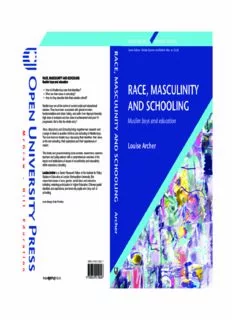
Race, Masculinity and Schooling (Educating Boys, Learning Gender) PDF
Preview Race, Masculinity and Schooling (Educating Boys, Learning Gender)
archerPB627.qxd 1/22/2007 3:25 PM Page 1 EDUCATING BOYS LEARNING GENDER Series Editors: Debbie Epstein and Máirtín Mac an Ghaill R A C E , RRAACCEE,, MMAASSCCUULLIINNIITTYY AANNDD SSCCHHOOOOLLIINNGG M MMuusslliimm bbooyyss aanndd eedduuccaattiioonn A RACE, MASCULINITY • How do Muslim boys see their identities? S (cid:127) What are their views of schooling? C (cid:127) How do they describe their lives outside school? U AND SCHOOLING Muslim boys are at the centre of current social and educational L debates.They have been associated with global terrorism, I fundamentalism and urban rioting, and suffer from disproportionately N high rates of exclusion and low rates of achievement and post-16 I Muslim boys and education progression.But is this the whole story? T Y Race, Masculinity and Schoolingbrings together new research and a range of views to examine the lives and schooling of Muslim boys. A The book features Muslim boys discussing their identities, their views on life and schooling, their aspirations and their experiences of N Louise Archer racism. D This timely and ground-breaking book provides researchers, students, S teachers and policy-makers with a comprehensive overview of the C impact and implications of issues of race/ethnicity and masculinity within secondary schooling. H O LLoouuiissee AArrcchheerris a Senior Research Fellow in the Institute for Policy Studies in Education at London Metropolitan University.She O researches issues of race, gender, social class and education including:widening participation to Higher Education;Chinese pupils' L identities and aspirations;and inner-city pupils who 'drop out' of I schooling. N G cover design:Kate Prentice A r c h e r (cid:10)(cid:11)(cid:12)(cid:13)(cid:14)(cid:4)(cid:15)(cid:5)(cid:5)(cid:6)(cid:15)(cid:7)(cid:8)(cid:4)(cid:9)(cid:7)(cid:15)(cid:2) (cid:1) (cid:2)(cid:3)(cid:4)(cid:5)(cid:5)(cid:6) (cid:7)(cid:8)(cid:4)(cid:9)(cid:7)(cid:9) Race, masculinity and schooling EDUCATING BOYS, LEARNING GENDER Series editor: Debbie Epstein and Ma´irtı´n Mac an Ghaill This timely series provides a well articulated response to the current con- cerns about boys in schools. Drawing upon a wide range of contemporary theorizing, the series authors debate questions of masculinities and high- light the changing nature of gender and sexual interactions in educational institutions.Theaimthroughoutistoofferteachersandotherpractitioners grounded support and new insights into the changing demands of teaching boys and girls. Current and Forthcoming titles: Louise Archer: Race, Masculinity and Schooling: Muslim Boys and Education Madeleine Arnot: Boy’s Work: Teacher Initiatives on Masculinity and Gender Equality Christine Skelton: Schooling the Boys: Masculinities and Primary Education Martin Mills: Challenging Violence in Schools: An Issue of Masculinities Leonie Rowan et al: Boys, Literacies and Schooling: The Dangerous Territories of Gender-based Literacy Reform Race, masculinity and schooling: Muslim boys and education Louise Archer Open University Press OpenUniversity Press McGraw-HillEducation McGraw-HillHouse ShoppenhangersRoad Maidenhead,Berkshire EnglandSL62QL email:[email protected] worldwide web:www.openup.co.uk Firstpublished 2003 Copyright#Louise Archer 2003 Allrightsreserved. Except forthe quotationof short passages forthe purposeof criticism andreview, nopart of thispublicationmay bereproduced, storedin a retrieval system,ortransmitted, inany formorbyanymeans,electronic, mechanical, photocopying,recording orotherwise, withouttheprior written permission ofthe publisherora licence from theCopyright Licensing Agency Limited.Details of suchlicences (for reprographic reproduction) maybe obtained fromtheCopyright Licensing Agency Ltdof 90Tottenham CourtRoad, London, W1T4LP. Acataloguerecord for thisbookisavailablefrom theBritish Library. ISBN 0 335 210627 (pb) 0 335 210635 (hb) Library ofCongress Cataloging-in-Publication Data CIPdataappliedfor TypesetbyYHT Ltd,London Printedin GreatBritain byBell andBain Ltd,Glasgow For Lesley and John Archer Contents Series editors’ preface ix Acknowledgements xi Introduction 1 Part I Debates and issues 5 1 Gender, ethnicity and education: the theoretical and policy context 7 2 Muslim pupils: current debates and issues 26 Part II Identities 45 3 ‘Race’, religion and masculinity in school 47 4 Boys, girls and gendered identities 66 5 Identities out of school: home, leisure and family 87 Part III Linking identities and inequalities 105 6 Muslim boys and racism(s) 107 7 Educational and occupational aspirations 129 8 Conclusion: Muslim boys and schooling 155 References 170 Index 186 Series editors’ preface Educating boys is currently seen – both – globally and locally – to be in crisis. In fact, there is a long history to the question: what about the boys? However, it was not until the 1990s that the question of boys’ education became a matter of public and political concern in a large number of countries around the world, most notably the UK, the USA and Australia. Thereareanumberofdifferentapproachestotroublingquestionsabout boys in schools to be found in the literature. The questions concern the behaviours and identities of boys in schools, covering areas such as school violence and bullying, homophobia, sexism and racism, through to those aboutboys’perceivedunderachievement.InFailingBoys?IssuesinGender and Achievement, Epstein and her colleagues (1998) identify three specific discourses that are called upon in popular and political discussions of the schoolingofboys:‘poorboys’;‘failingschools,failingboys’;and‘boyswill beboys’.Theysuggestthat it mightbeuseful todraw,instead, onfeminist andprofeministinsightsinordertounderstandwhatisgoingonintermsof gender relations between boys and girls and amongst boys. Important questions,they suggest,are:whatkindofmasculinitiesare beingproduced in schools, in what ways, and how do they impact upon the education of boys? In other words, there is an urgent need to place boys’ educational experiences within the wider gender relations within the institution and beyond. Despite the plethora of rather simplistic and often counter-productive ‘solutions’(suchasmakingclassroomsmore‘boy-friendly’inmachoways) thatarecomingfromgovernmentsindifferentpartoftheEnglish-speaking world and from some of the more populist writers in the area (e.g. Steve Biddulph), there is a real necessity for a more thoughtful approach to the issues raised by what are quite long-standing problems in the schooling of boys. Approaches for advice to researcher in the field of ‘boys’ under-
Description: